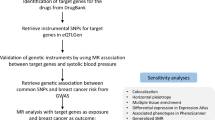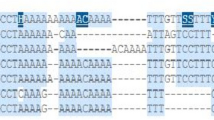Abstract
Currently, twelve validated genetic variants have been identified that are associated with urinary bladder cancer (UBC) risk. However, those validated variants explain only 5–10% of the overall inherited risk. In addition, there are more than 100 published polymorphisms still awaiting validation or disproval. A particularly promising of the latter unconfirmed polymorphisms is rs2854744 that recently has been published to be associated with UBC risk. The [A] allele of rs2854744 has been reported to be associated with a higher promoter activity of the insulin-like growth factor-binding protein-3 (IGFBP3) gene, which may lead to increased IGFBP-3 plasma levels and cancer risk. Therefore, we investigated the association of rs2854744 with UBC in the IfADo case–control series consisting of 1,450 cases and 1,725 controls from Germany, Hungary, Venezuela and Pakistan. No significant association of rs2854744 with UBC risk was obtained (all study groups combined: unadjusted P = 0.4446; adjusted for age, gender and smoking habits P = 0.6510), besides a small effect of the [A] allele in the Pakistani study group opposed to the original findings (unadjusted P = 0.0508, odds ratio (OR) = 1.43 for the multiplicative model) that diminished after adjustment for age, gender and smoking habits (P = 0.7871; OR = 0.93). Associations of rs2854744 with occupational exposure to urinary bladder carcinogens and smoking habits were also not present. A meta-analysis of all available case–control series including the original discovery study resulted in an OR of 1.00 (P = 0.9562). In conclusion, we could not confirm the recently published hypothesis that rs2854744 in the IGFBP3 gene is associated with UBC risk.



Similar content being viewed by others
References
Al-Zahrani A, Sandhu MS, Luben RN et al (2006) IGF1 and IGFBP3 tagging polymorphisms are associated with circulating levels of IGF1, IGFBP3 and risk of breast cancer. Hum Mol Genet 15:1–10
Barrett JC, Fry B, Maller J, Daly MJ (2005) Haploview: analysis and visualization of LD and haplotype maps. Bioinformatics 21:263–265
Bell DA, Taylor JA, Paulson DF, Robertson CN, Mohler JL, Lucier GW (1993) Genetic risk and carcinogen exposure: a common inherited defect of the carcinogen-metabolism gene glutathione S-transferase M1 (GSTM1) that increases susceptibility to bladder cancer. J Natl Cancer Inst 85:1159–1164
Canzian F, McKay JD, Cleveland RJ et al (2006) Polymorphisms of genes coding for insulin-like growth factor 1 and its major binding proteins, circulating levels of IGF-I and IGFBP-3 and breast cancer risk: results from the EPIC study. Br J Cancer 94:299–307
Cheng I, DeLellis Henderson K, Haiman CA, Kolonel LN, Henderson BE, Freedman ML, Le Marchand L (2007) Genetic determinants of circulating insulin-like growth factor (IGF)-I, IGF binding protein (BP)-1, and IGFBP-3 levels in a multiethnic population. J Clin Endocrinol Metab 92:3660–3666
Costalonga EF, Antonini SR, Guerra-Junior G, Mendonca BB, Arnhold IJ, Jorge AA (2009) The -202 A allele of insulin-like growth factor binding protein-3 (IGFBP3) promoter polymorphism is associated with higher IGFBP-3 serum levels and better growth response to growth hormone treatment in patients with severe growth hormone deficiency. J Clin Endocrinol Metab 94:588–595
Cox A, Dunning AM, Garcia-Closas M et al (2007) A common coding variant in CASP8 is associated with breast cancer risk. Nat Genet 39:352–358
D’Aloisio AA, Schroeder JC, North KE et al (2009) IGF-I and IGFBP-3 polymorphisms in relation to circulating levels among African American and Caucasian women. Cancer Epidemiol Biomarkers Prev 18:954–966
Deal C, Ma J, Wilkin F et al (2001) Novel promoter polymorphism in insulin-like growth factor-binding protein-3: correlation with serum levels and interaction with known regulators. J Clin Endocrinol Metab 86:1274–1280
Deming SL, Ren Z, Wen W, Shu XO, Cai Q, Gao YT, Zheng W (2007) Genetic variation in IGF1, IGF-1R, IGFALS, and IGFBP3 in breast cancer survival among Chinese women: a report from the Shanghai Breast Cancer Study. Breast Cancer Res Treat 104:309–319
Dupont WD, Plummer WD (1990) Power and sample size calculations: a review and computer program. Control Clin Trials 11:116–128
Dupont WD, Plummer WD (1998) Power and sample size calculations for studies involving linear regression. Control Clin Trials 19:589–601
García-Closas M, Hein DW, Silverman D et al (2011) A single nucleotide polymorphism tags variation in the arylamine N-acetyltransferase 2 phenotype in populations of European background. Pharmacogenet Genomics 21:231–236
Golka K, Prior V, Blaszkewicz M et al (1996) Occupational history and genetic N-acetyltransferase polymorphism in urothelial cancer patients of Leverkusen, Germany. Scand J Work Environ Health 22:332–338
Golka K, Reckwitz T, Kempkes M et al (1997) N-Acetyltransferase 2 (NAT2) and glutathione S-transferase μ (GSTM1) in bladder-cancer patients in a highly industrialized area. Int J Occup Environ Health 3:105–110
Golka K, Hermes M, Selinski S et al (2009) Susceptibility to urinary bladder cancer: relevance of rs9642880[T], GSTM1 0/0 and occupational exposure. Pharmacogenet Genomics 19:903–906
Golka K, Selinski S, Lehmann ML et al (2011) Genetic variants in urinary bladder cancer: collective power of the “wimp SNPs”. Arch Toxicol 85:539–554
Hengstler JG, Arand M, Herrero ME, Oesch F (1998) Polymorphisms of N-acetyltransferases, glutathione S-transferases, microsomal epoxide hydrolase and sulfotransferases: influence on cancer susceptibility. Recent Results Cancer Res 154:47–85
Kempkes M, Golka K, Reich S, Reckwitz T, Bolt HM (1996) Glutathione S-transferase GSTM1 and GSTT1 null genotypes as potential risk factors for urothelial cancer of the bladder. Arch Toxicol 71:123–126
Kiemeney LA, Thorlacius S, Sulem P et al (2008) Sequence variant on 8q24 confers susceptibility to urinary bladder cancer. Nat Genet 40:1307–1312
Kiemeney LA, Sulem P, Besenbacher S et al (2010) A sequence variant at 4p16.3 confers susceptibility to urinary bladder cancer. Nat Genet 42:415–419
Lai JH, Vesprini D, Zhang W, Yaffe MJ, Pollak M, Narod SA (2004) A polymorphic locus in the promoter region of the IGFBP3 gene is related to mammographic breast density. Cancer Epidemiol Biomarkers Prev 13:573–582
Lehmann ML, Selinski S, Blaszkewicz M et al (2010) Rs710521[A] on chromosome 3q28 close to TP63 is associated with increased urinary bladder cancer risk. Arch Toxicol 84:967–978
Lewis CM (2002) Genetic association studies: design, analysis and interpretation. Briefings in Bioinformatics 3:146–153
Mong JL, Ng MC, Guldan GS et al (2009) Associations of insulin-like growth factor binding protein-3 gene polymorphisms with IGF-I activity and lipid parameters in adolescents. Int J Obes (Lond) 33:1446–1453
Moon JW, Chang YS, Ahn CW et al (2006) Promoter -202 A/C polymorphism of insulin-like growth factor binding protein-3 gene and non-small cell lung cancer risk. Int J Cancer 118:353–356
Moore LE, Baris DR, Figueroa JD et al (2011) GSTM1 null and NAT2 slow acetylation genotypes, smoking intensity and bladder cancer risk: results from the New England bladder cancer study and NAT2 meta-analysis. Carcinogenesis 32:182–189
Rafnar T, Sulem P, Stacey SN et al (2009) Sequence variants at the TERT-CLPTM1L locus associate with many cancer types. Nat Genet 41:221–227
Ricketts C, Zeegers MP, Lubinski J, Maher ER (2009) Analysis of germline variants in CDH1, IGFBP3, MMP1, MMP3, STK15 and VEGF in familial and sporadic renal cell carcinoma. PLoS One 4:e6037
Risch A, Wallace DM, Bathers S, Sim E (1995) Slow N-acetylation genotype is a susceptibility factor in occupational and smoking related bladder cancer. Hum Mol Genet 4:231–236
Rosendahl AH, Hietala M, Henningson M, Olsson H, Jernström H (2011) IGFBP1 and IGFBP3 polymorphisms predict circulating IGFBP-3 levels among women from high-risk breast cancer families. Breast Cancer Res Treat 127:785–794
Rothman N, Garcia-Closas M, Chatterjee N et al (2010) A multi-stage genome-wide association study of bladder cancer identifies multiple susceptibility loci. Nat Genet 42:978–984
Safarinejad MR (2011) Insulin-like growth factor binding protein-3 (IGFBP-3) gene variants are associated with renal cell carcinoma. BJU Int 108:762–770
Safarinejad MR, Shafiei N, Safarinejad SH (2011) The association between bladder cancer and a single nucleotide polymorphism (rs2854744) in the insulin-like growth factor (IGF)-binding protein-3 (IGFBP-3) gene. Arch Toxicol [Epub ahead of print]
Saravana Devi S, Vinayagamoorthy N, Agrawal M et al (2008) Distribution of detoxifying genes polymorphism in Maharastrian population of central India. Chemosphere 70:1835–1839
Schumacher FR, Cheng I, Freedman ML et al (2010) A comprehensive analysis of common IGF1, IGFBP1 and IGFBP3 genetic variation with prospective IGF-I and IGFBP-3 blood levels and prostate cancer risk among Caucasians. Hum Mol Genet 19:3089–3101
Selinski S, Blaszkewicz M, Lehmann M-L et al (2011) Genotyping NAT2 with only two SNPs (rs1041983 and rs1801280) outperforms the tagging SNP rs1495741 and is equivalent to the conventional 7-SNP NAT2 genotype. Pharmacogenet Genomics [Epub ahead of print]
Slattery ML, Samowitz W, Curtin K, Ma KN, Hoffman M, Caan B, Neuhausen S (2004) Associations among IRS1, IRS2, IGF1, and IGFBP3 genetic polymorphisms and colorectal cancer. Cancer Epidemiol Biomarkers Prev 13:1206–1214
Terracciano D, Bruzzese D, Ferro M et al (2011) Preoperative insulin-like growth factor-binding protein-3 (IGFBP-3) blood level predicts gleason sum upgrading. Prostate [Epub ahead of print]
Terry KL, Tworoger SS, Gates MA, Cramer DW, Hankinson SE (2009) Common genetic variation in IGF1, IGFBP1 and IGFBP3 and ovarian cancer risk. Carcinogenesis 30:2042–2046
Wagner K, Hemminki K, Israelsson E et al (2005) Polymorphisms in the IGF-1 and IGFBP3 promoter and the risk of breast cancer. Breast Cancer Res Treat 92:133–140
Wang L, Habuchi T, Tsuchiya N et al (2003) Insulin-like growth factor-binding protein-3 gene -202 A/C polymorphism is correlated with advanced disease status in prostate cancer. Cancer Res 63:4407–4411
Wu X, Ye Y, Kiemeney LA, Sulem P et al (2009) Genetic variation in the prostate stem cell antigen gene PSCA confers susceptibility to urinary bladder cancer. Nat Genet 41:991–995; Erratum: Nat Genet 41:1156
Acknowledgments
The authors thank Ms Kirsten Liesenhoff-Henze, Ms Marion Page and Ms Claudia Schulte-Dahmann for excellent technical support.
Author information
Authors and Affiliations
Corresponding author
Additional information
Jan G. Hengstler and Klaus Golka shared senior authorship.
Electronic supplementary material
Below is the link to the electronic supplementary material.
Rights and permissions
About this article
Cite this article
Selinski, S., Lehmann, ML., Blaszkewicz, M. et al. Urinary bladder cancer risk in relation to a single nucleotide polymorphism (rs2854744) in the insulin-like growth factor-binding protein-3 (IGFBP3) gene. Arch Toxicol 86, 195–203 (2012). https://doi.org/10.1007/s00204-011-0747-5
Received:
Accepted:
Published:
Issue Date:
DOI: https://doi.org/10.1007/s00204-011-0747-5




